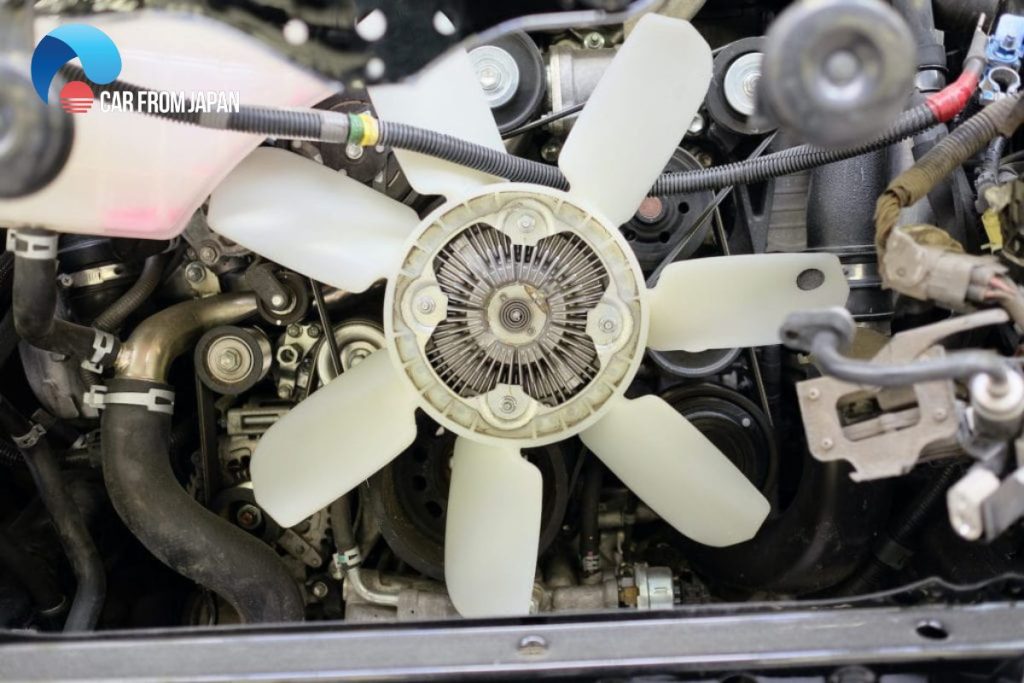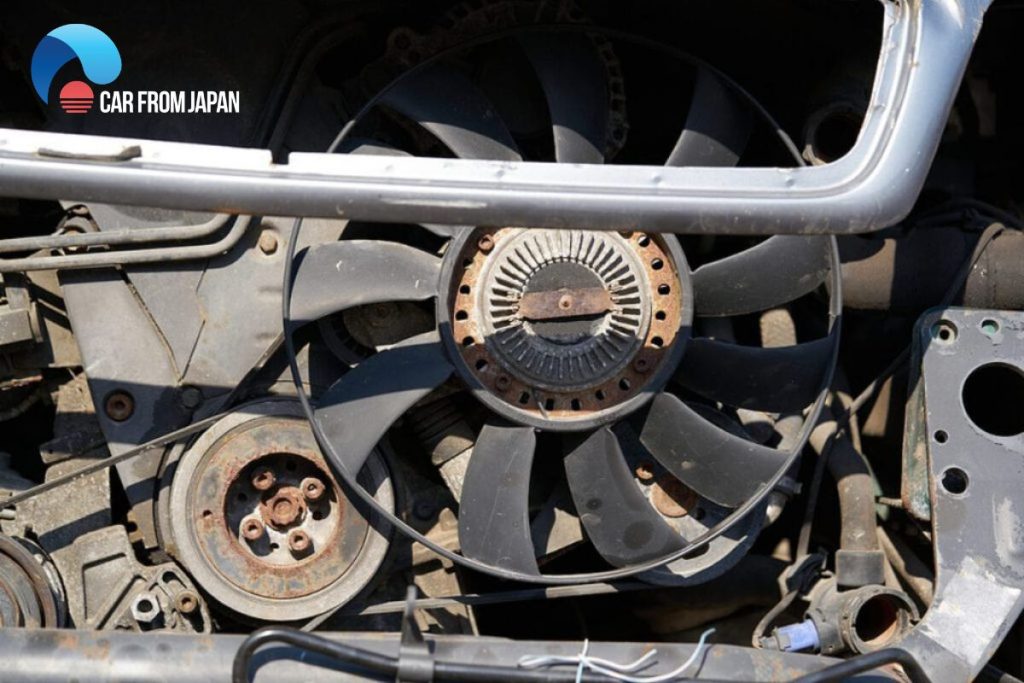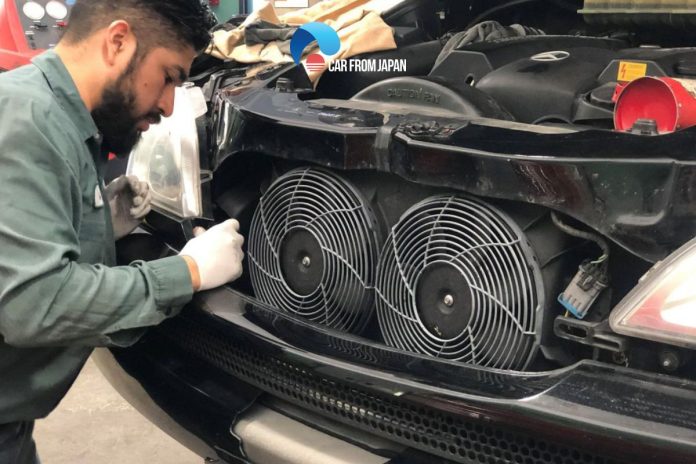Radiator fans are designed to turn on when the temperature in your car engine reaches a certain level (around 200 F). So what will happen If your radiator fan runs constantly even when the car engine is off? Read the article and you will find a couple of reasons and how to fix this problem.
Contents
Does The Radiator Fan Always Run?
In normal operation, the radiator fan doesn’t run all the time. The fan is hooked to a sensor that measures the coolant temperature in the radiator, and when the temperature gets a little on the high side, the sensor will (basically) send a signal that turns the fan on.
The fan is designed to turn on only when the engine reaches a certain temperature. This is to ensure efficient cooling when needed and prevent unnecessary wear and tear on the fan motor.
When the radiator fan is activated? The engine temperature will activate the radiator fan to turn on. And your fan will turn off once the motor has cooled down below 200 degrees. When your coolant reaches about 200-230 degrees, the radiator fan will start on. Normally, it will take 15-20 minutes for the radiator fan to turn on after the control valve is off.
In other situations, the radiator fan will turn on:
- Idling or low speeds: In situations like traffic jams or slow driving, the fan may run more frequently to compensate for reduced airflow over the radiator.
- Air conditioning use: Using the air conditioner puts extra load on the engine, which can increase its temperature and trigger the fan to run more often.
If you notice that your radiator fan runs when engine is cold or off, it’s a sign of a potential problem that needs to be investigated.

Why My Radiator Fan Runs Constantly.
Are you probably concerned that why does my radiator fan stay on when my car is off? There are many things that can happen to your car from a bad fan switch to stuck fan relay or faulty fan clutch. To know more details about what are the reasons behind the scenario, keep reading:
Faulty temperature sensor
The cause of the radiator fan running continuously may come from the temperature sensor, which is the part that determines when the radiator fan must operate.
The coolant temperature sensor is a thermistor and its resistance changes when the coolant temperature changes. When resistance changes, the signal is sent to ECU and it will determine when to activate the radiator cooling fan when a certain temperature is met.
When the temperature sensor does not operate properly, the consequence is that the signal to send the computer is incorrect and makes your coolant keep running. This problem can be fixed by finding the location of the temperature sensor, trying to disconnect the wire, or connecting to another sensor.
Stuck fan relay
An important reason that we can’t help but mention is that your car had an issue with the cooling fan radiator. Think of the cooling fan relay as the main display that controls the operation of the cooling fan.
If this part doesn’t work, nothing is preventing the fan from kicking in as the engine temperature drops to the required threshold. To know the exact level of the relay’s damage, you can use the VOM meter to measure the relay voltage.
If the meter is only 12V, it is normal, otherwise, the relay is damaged and needs to be replaced. Identify the location of the relay from the fuse box then pull out the problematic relay.
Defective fan switch
You’ve probably heard of a component that’s called a cooling fan switch. This system is linked to the thermostat and works just like the HVAC system in your home.
If either of these components fails – your radiator fan turns on continuously and this causes serious problems. The function of a fan switch is similar to the coolant temperature sensor work.
It means that when a certain temperature is met, the fan switch will send the signal to the computer and activate the cooling fan.
Having trouble with the ECU unit
ECU unit performs the task of processing data and controlling the activities that take place inside the engine car. When this part has a problem, the operation of the vehicle will immediately be interrupted. As a general rule, the ECU will send the signal to the fan to kick off if the cooling system is still hot. The ECU tells the fan when to turn it on or off. When a faulty ECU, it cannot tell the cooling fan when to turn off.
Short in the electrical wires
If you check that the engine has cooled down and the radiator fan is still running, the negative wire is most likely damaged. If the engine design provides for two coolant temperature sensors, then if the “minus” sign of the first sensor fails, the fan will run on ignition.
In case of insulation failure of the wires of the second coolant temperature sensor, the fan runs continuously while the engine is running. At this time, the user of the vehicle needs to unplug the two poles of the wire and check the operation of the current through the voltmeter.
If no power goes through, the wire is damaged. In addition, this way also helps users locate the fan relay on the hood. Check the current from the relay to the fan, if the power appears there, it means that the car cooling fan has a problem.
Damaged fan clutch
The fan clutch works to attach the radiator fan to the engine system and make the motor run. The fan will not operate properly if the clutch is going bad. The wear and tear after a long time of use causes the clutch spring to corrode. When the springs are corroded, it will interrupt the movement of the engine and can make your car not run.
Read more: 8 Common Symptoms of a Clogged Radiator You Must Know
What Happens If A Radiator Fan Keeps Running When Car Is Off?
The answer depends on the duration that your radiator fan runs. It will be a normal situation if after running your engine, the water in the radiator is hot and needs to be cooled down.
Once you turn off the engine, the car’s computer senses that the radiator is at a higher temperature and still needs to dissipate heat. But if your radiator fan stays generally more than 2 minutes, then contact service repair. There is probably a part that can go wrong.
If the fan runs for a long time, the fan can be damaged due to overuse. The purpose of designing this part is only to turn it on and off when necessary and if the radiator fan runs continuously, this will shorten the lifetime of this component, and more seriously, it can drain off your battery causing your car not to start.
On the market, most fans of modern cars have a module that tells you when to turn them on and off. Maybe you have a faulty module or relay in your car.

How To Prevent When Your Radiator Fan Runs Constantly?
The cooling process for cars plays a very important role, no less than engine lubrication. Therefore, besides paying attention to monitoring and changing the car’s oil periodically.
You also need to regularly check the radiator fan control system to ensure that this part always operates well. Below are instructions on how to check the basic radiator fan to help limit the condition of the fan running continuously:
Inspect and clean the radiator fan
Drivers should test the fan by opening the car hood, starting the engine, and setting the air conditioner to the highest temperature. At the same time, you should monitor the temperature gauge to make sure that the overheating motor does not overheat.
If your radiator, both the main and the A/C radiator, is covered by dirt, the heat exchange process will be disturbed. As a consequence, the fan must spin almost continuously to cool the system. Cleaning the fan is a very important step. You can use the degreaser to remove all the dirt on the fan housing and also the blades.
Fan wiring and power supply
After cleaning every space of your radiator fan, please check the wiring and power supply. These are two types of positive and negative wires that provide power to the fan. Drivers need to unplug the lead from the fan and check the connector for damage, corrosion, or poor connection.
Check the car coolant
One of the simplest ways to make sure your fan isn’t damaged is to inspect your coolant. This is a very easy you can do to ensure your engine runs at the optimum temperature.
Just open the hood and check the level of the coolant. This has min and maximum markers on it. The standard liquid level to help your fan work properly should be between these two levels.
When all parts don’t have abnormal signs, don’t forget to diagnose the ECU unit. If it happens to your car, disassembling and dismantling the ECU is the necessary step. After that, you should inspect the internal board inside ECU and you can even clean it with oxides with alcohol.
Read more: Car Radiator Fan Not Working: Troubleshooting 6 Common Problems
FAQs
Does radiator fan consume more fuel?
Yes, a radiator fan does consume more fuel, but indirectly. The fan is powered by the engine. When it runs, it draws power from the engine, which in turn requires more fuel to compensate for the extra load. The extra energy required to run a frequently operating cooling fan puts a strain on the engine, leading to higher fuel consumption.
How long should the fan run after the engine is off?
It’s common for the radiator fan in modern vehicles to continue operating for a short period (1-2 minutes) after the engine is shut off, regardless of the outside temperature or driving intensity. This helps dissipate residual heat from the engine and prevent potential overheating issues.
Can a constantly running radiator fan damage my car?
While the fan itself won’t be damaged, the underlying issue causing it to run constantly could lead to engine overheating and potential damage if not addressed.
Closing Thoughts
For the radiator to cool the car system. A large amount of air is required to pass through the aluminum fins. The radiator fan creates the necessary airflow and increases air circulation when entering the radiator, helping to cool the engine more efficiently.
When the cooling fan runs constantly, it will affect the performance of your engine. And more serious consequences can happen so it is necessary to detect this problem in time.
However, many reasons cause this phenomenon that sometimes make it hard to diagnose exactly the cause. Through our article, we hope that it will partly help to handle this problem.



